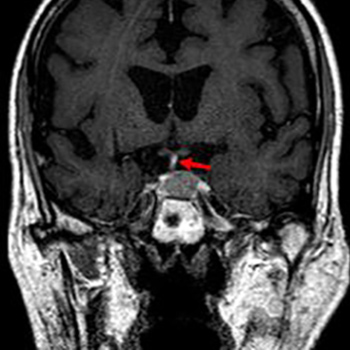Keywords
Pituitary neoplasms, hypophysitis, hypopituitarism, secukinumab
Abstract
Pituitary adenomas are the most common cause of hypopituitarism associated with pituitary enlargement, but other aetiologies have been emerging, namely immune checkpoint inhibitor-induced hypophysitis (ipilimumab, nivolumab and pembrolizumab). Secukinumab is a recently approved human monoclonal antibody used for the treatment of psoriasis, with no know reported cases of hypophysitis. We describe a challenging case of panhypopituitarism in a patient with a pituitary incidentaloma and a temporal relationship between secukinumab initiation and the manifestation of clinical features suggestive of hypopituitarism. In such intricate work-up, the differential diagnoses should be carefully considered, taking into account the therapeutic and prognostic implications.
References











